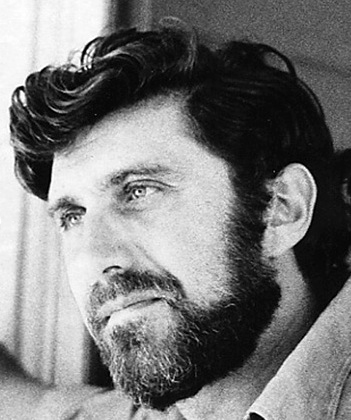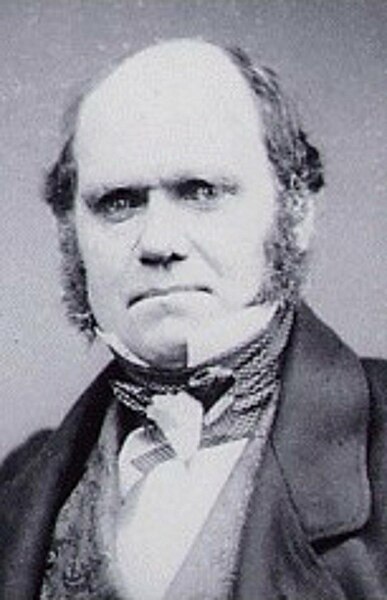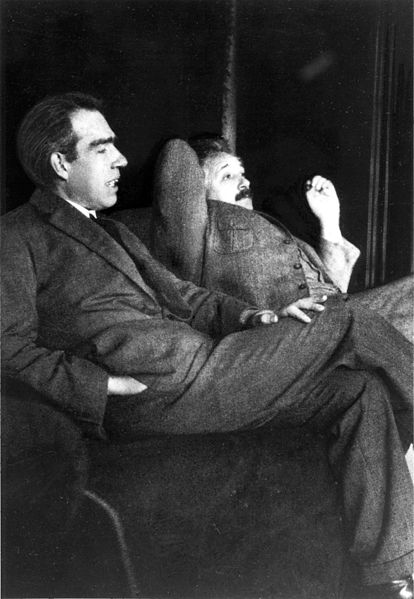Truth
to Power?
There
are millions of educated, decent,
well-intentioned people in the world today who try to speak, write, and live to
“tell truth to power”. This, for millions of educated people today, is the
measure of a speaker or writer’s decency or character. Does the person try diligently to
tell truth to power?
What they mean is that a decent person is willing to risk
her/his own security, comfort, even life, to say what she/he truly thinks to
authority figures. This is the postmodernist measure of virtue, the one used in most departments of most universities in the world today.
If
you follow this blog, you know that I disagree bitterly with the postmodernist
position. The reason is revealed in a close analysis of this “tell truth to
power” worldview. The postmodernists are not evil. But they are dangerously
wrong.

Michel Foucault (credit: Wikipedia)
We
can begin to discuss why this is so by going back to some of the words of
French philosopher Michel Foucault, the postmodernists’ main guru.
There
is some impressive scholarship and thinking in Fearless Speech, a small but influential book based on a series of
seminars he gave in the U.S. back in 1983, as he was rising to the peak of his influence
in the academic world. Again, I repeat: I believe he was a man of
good-intentions. He was just wrong.
Why?
Because his case for fearless speech is full of incoherent reasoning. What he
claims is a moral position for a person to take just makes a muddle of life in
the real world. It is a position, or worldview (if you like), that gives real
people little useful guidance as they try to make their way through life, and
in fact steers them toward making more pain in the world.
What
claims that he makes am I disturbed by? Let’s get into it.
He
begins by borrowing the term “parrhesia” from the ancient Greeks. This is the term for the virtue
exhibited by persons who confront people in power and tell the powerful ones what
they are doing wrong. A parrhesiastes tells the truth to authority figures and
does not let possible bad consequences for himself deter him. (In our times, we
would add that a parrhesiastes can be a female person, but the Greeks 2500 or
so years ago did not allow for this possibility.)
The
clear indicators that a speaker is a parrhesiastes are the following:
Frankness:
the person is saying all
that is on his mind and that is relevant to
the matter being discussed at the time.
the matter being discussed at the time.
Truthfulness:
the person is saying what she/he absolutely believes is true.
the person is saying what she/he absolutely believes is true.
Risk:
the person, by speaking out, is risking punishment from authority.
the person, by speaking out, is risking punishment from authority.
Duty:
the person will not gain from speaking out; she/he is clearly acting out
of a sense of duty to some greater good (justice, democracy, etc.)
the person will not gain from speaking out; she/he is clearly acting out
of a sense of duty to some greater good (justice, democracy, etc.)
These descriptors match closely what a witness promises to do when giving sworn testimony in a trial. The truth, the whole truth, and nothing but the truth.
So
what is my problem with “fearless speech”, this “telling truth to power”?
The
problem seems glaringly clear to me, but maybe it needs to be said plainly.
What
“truth”? Whose “truth”? And most of all, how do you know it’s true?
A
person can be open, sincere, brave, and stuffed with honorable intentions, and
still be wrong. Bravely saying to a tyrant things that one passionately
believes are true does not guarantee anything about whether those things really
are true, that is, are consistent with reality.
In
the terms of philosophers, one of Plato’s criteria for any person’s being able
to say she/he “knows” something has been lost. Knowledge, in his philosophy, is
true, justified belief.
In
an aside, we should say that Plato's larger body of work is useless to us if we
want to figure out what qualifies as “justified”. He thinks sensitive souls can
get the necessary justification for all true beliefs from inside the workings
of their own minds, before considering empirical, sense data at all. This
position has been shown by centuries of history, practical experience, and especially
Science to be more likely to lead us astray than to lead us to any useful truths. Maybe,
Plato’s fascist system in his major work, The
Republic, was the inevitable outcome of his way of thinking about knowledge.
But
in the defining of what makes knowledge, Plato was on a good track. We need to be
able to give justification for the things we claim to know.

Francis Bacon (credit: Wikimedia Commons)
In
the largest view of Philosophy, the way out of this problem of determining what
we can say we know was shown by Francis Bacon. When you think you have hit upon
a truth of any kind, said Bacon, you don’t delve further into your own deepest
beliefs to see whether your new knowledge is consistent with the rest of your
beliefs. You might be simply building a more complicated set of mistaken
beliefs if you do that.
Instead,
you do pretty much the opposite. You go back to the material world and test this
new knowledge you think you’ve found. Figure out ways to test, in the real
world, whether the model of reality that you say is so is really so. This is the
“inductive” way to knowledge. It is the way of Science.

Ent lady (credit: Wikimedia Commons)
And
if your statement can’t be tested in reality, then, in the terms of Science, you
are not talking about anything real at all. You are speaking fantasy. About as
real as Tolkien’s ents or Frank
Herbert’s melange. They’re fun to
imagine. But in reality there are no ents.
This
trusting in the passion and courage of a speaker to indicate to us whether
she/he is speaking something that we should be paying attention to is fraught
with hazards. The problem is more than that the person can be honest,
impassioned and apparently free of self-serving motives and still be wrong. And
the problem is more than the fact that bitching with heat and a big vocabulary and no evidence is still, in the end, just bitching.
The
bigger problem is that we may very well be convinced that we are telling a
truth to power with no intention to gain anything for ourselves and yet be
wrong even about our own motives. We might be gaining for ourselves comforts too
subtly buried in our own subconscious minds for us to be aware of them.

Elliot Aronson (credit: Vera Aronson, via Wikimedia Commons)
This
matter was examined in deeply revealing ways by social psychologists Leon
Feistinger and Elliot Aronson, years ago.
Essentially
what they revealed is that all humans tend to notice the evidence and navigate
to the arguments that support the views – the “truths” – that they wanted to
believe from before they began to consider the matter that they are now speaking
of. We humans constantly try to keep our present beliefs, words, and actions consistent
with our past words and actions. We tend to constantly apply much more critical
standards to those who disagree with us than we do to our friends and
ourselves. Deep inside, apparently, we need to like ourselves. In Aronson’s terms,
we are all inclined toward cognitive dissonance
reduction. (Bacon saw and described this weakness in human thinking in the
1600’s.)
The
hazard for any of us seeking truth and wishing to speak it to others is that we
often, for deep, subconscious reasons, omit, ignore, or try to discredit what
the empirical evidence is really showing us.
There
are people who have risen above their own biases, but it isn’t easy to do. It
takes dedication to the pursuit of observable results. The way of Science, in
other words. Watch events. Form hypotheses, models, and theories. Figure out
how to test whether your model gives a correct picture of reality. Do the test.
Carefully observe what happens. Record what you observe with scrupulous
honesty. Discuss what you find with colleagues. Revise your model or theory as
you think it needs to be modified to bring it more in line with reality. Repeat.

Charles Darwin (credit: Wikimedia Commons)
For
years, Darwin did not like what his observations of nature were telling him. Bohr,
Heisenberg, Schrodinger, and the other quantum theorists could hardly believe
the picture of matter that their theory was showing them. Einstein, the hero of
many of them, refused to believe till his dying day that quantum theory was
giving a complete picture of the universe. There are lots of other examples of
people who pursued where Science led them, even when they did not like the
conclusions that it was showing.
To
Science, whether any of these people were comforted or discomforted by what
their research was telling them was irrelevant. The point of the scientific
method is that, strictly adhered to, it can lead us past personal biases.
Now,
how is all this relevant to a discussion of “speaking truth to power”?
Foucault
and his adherents are chasing delusions. They are making every dispute worse.
They leave us stranded in endless debates between irreconcilable views on pretty
much every matter we might want to discuss. Why? Because passion, honesty, full
disclosure, and unselfish motives may still be defending falsehoods. When feelings trump facts, no dispute can ever be resolved.
How is a
postmodernist judge to resolve a dispute between two parties who both cry exactly
equal numbers of tears and both scream at exactly ninety decibels?
We end with
the clamor of millions of voices in which we are mired now. Then soon, the political
thugs start to look pretty good to the masses of voters, simply because at
least they can bring order out of the chaos. Creating chaos and then being the
one to bring order out of it is what Dr. Goebbels did for the Nazis, and, in particular,
Adolf Hitler. There are parallel examples in our times.
An
interesting example to examine closely in this discussion is one described in Fearless Speech by Foucault himself. He
notes that one does not have to be a student addressing a professor, a child
confronting an adult, or a speaker facing a tyrant in order to be a
parrhesiastes, a person telling truth to power. One may even be speaking a
painful truth to a friend. The risk is not of punishment, but of the loss of a
valued friendship. But the truth-telling will still take parrhesia.
Why
Foucault’s own example is so interesting is that its logical implications can
be followed to conclusions that probably Foucault and his adherents would not like. What I mean is that if we imagine a painful truth being told by one person
to one of her/his oldest friends, we can envision the scene in detail more readily
than we could the courageous ancient Greek standing before a tyrant. Most of us are not going to appear in any modern equivalent of that scenario, but most of
us have felt moved to tell a painful truth to an old friend at least a few
times in our lives. He has a habit that is annoying or he has just done
something that was out and out morally wrong.
“You should not have done that.
It was hurtful and uncalled for.”
The interesting insight comes when we see that the two persons involved are morally on the same plane as far as postmodernism is concerned. Both will be risking a valued friendship if they continue the discussion. Neither is on some sort of lower plane as far as power is concerned. Now, postmodernism, it seems to me, gets really stuck. How could any judge, even a very conscientious postmodernist one, ever pick which is the "decent" person here? But in real life, these kinds of disputes do get resolved. Even when one says the other is too bossy, and the other says her friend is too cautious and boring. Friends who really are friends often work out this kind of difference.
Most often, one friend will, at least at first, disagree bitterly. She/he does not share the other's view at all. She/he may end the friendship right then and there.
Most often, one friend will, at least at first, disagree bitterly. She/he does not share the other's view at all. She/he may end the friendship right then and there.
But
what’s far more likely to happen is that your friend will begin to examine things he has
said or done in the past with an eye to showing that your analysis of his character or his
actions is wrong. He is determined to show that he is not as you have just described him to be.
And
here's the kicker. In the argument that will probably follow, this friendship
may yet be saved. Both of you will look to your memories of real events, what
really happened in the past. Physical, material, empirical reality. Then, you
may come to agree on a path of self-improvement for both of you. Or agree to accept one another, flaws and all. In real life,
friends do these things for each other. That is why they are friends. And sometimes, subsequent experience shows that one of the friends is right, and the one who is proven right is not always easy to spot on the basis of who has "power" in the relationship. Sometimes the stock the criticized one put money into really does go up. Sometimes the new employee she hired turns out to be a good worker.

Bohr and Einstein in discussion
(credit: Paul Ehrenfest Graf, via Wikimedia Commons)
Thus,
implicit in Foucault’s picture of what it is to tell truth to power is the
assumption that disputes can be resolved by reasoning and evidence.
And now we can expand that insight.
And now we can expand that insight.
Can
citing evidence lead to beneficial resolution of a dispute even when courage
and honesty confront really dangerous power? Yes. Like the two friends, the
philosopher and the dictator always both have things they may lose. The king
may seem to risk nothing as he takes up his side of the confrontation, but he is,
in fact, always risking. If he makes a bad military decision and most of his
soldiers get killed, he can be overthrown by a foreign king. And executed. History
is also stuffed with examples of kings who were assassinated by their own
officers.
Maybe, the philosopher was sincerely trying to keep these things from happening. Most kings are aware that they can be wrong sometimes. If they aren't, then it is extremely unlikely that they will get to be kings. They know they can't know everything about everything. So they recruit and listen to wise counselors.
Maybe, the philosopher was sincerely trying to keep these things from happening. Most kings are aware that they can be wrong sometimes. If they aren't, then it is extremely unlikely that they will get to be kings. They know they can't know everything about everything. So they recruit and listen to wise counselors.
The king may have the philosopher beheaded, but it is very likely if
he has been in power for much time at all, he will be looking at the evidence
to see whether what the philosopher was saying was correct. Are his people
turning against him? Are assassination plots brewing among his officers? Is a foreign king landing troops on a beach a hundred miles away even now. What
did that philosopher say?
Evidence.
Reasoning. More useful than impassioned, dutiful, unselfish honesty. In the end, it is reality that we all must answer to.
The
whole pomo house of cards collapses.
Postmodernist
thinking is the root cause of the endless squalling that we see in the world. Debate after debate, speaker after speaker, including many postmoderns
confronting each other, all are being justified by scared speakers on the
grounds that they’re scared. Hurt feelings demanding to be soothed on the
grounds that they have hurt feelings.
Victimhood, feigned or real, is a measure of sense. What?
Victimhood, feigned or real, is a measure of sense. What?
It
can all be traced right back to the doorstep labeled “Postmodernism”. It is helping
nothing. It is only making every trouble in the world today worse.
In
the meantime, in spite of its flaws and shortcomings, Science can correct
itself. In fact, that is how it is designed. To be updated all the time.
Does
Science have useful things to say about good and bad, right and wrong? I think
that it does, but that is a much longer discussion. If you are interested, try
posts on this blog from last April 13 to September 8.
And
in any case, in the shadow of the mushroom cloud, have a thoughtful day.
No comments:
Post a Comment
What are your thoughts now? Comment and I will reply. I promise.